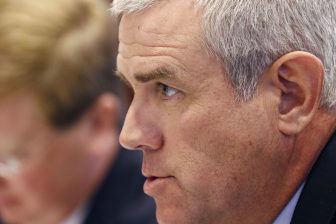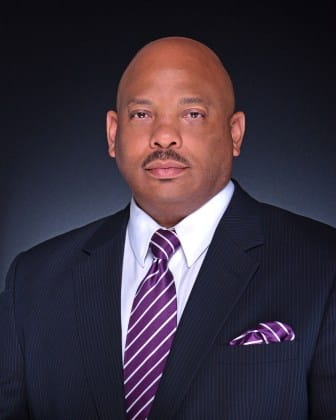
Mississippi House Speaker Philip Gunn was closely involved in one of the harrowing stories featured in an explosive investigation into the mishandling of sexual abuse within Southern Baptist Convention churches.
The 300-page report, made public by the nation’s largest Protestant denomination this week, reveals that top Southern Baptist leaders across the nation systemically mishandled sexual abuse claims, often working to cover them up and suppress victims and their families. The report was compiled by a third-party firm, which scrutinized more than 20 years of sexual abuse accusations in Southern Baptist churches across the nation.
A Mississippi case involving a decades-long coverup and high-ranking Baptist officials defending an abuser was highlighted in the report. Though Gunn is not named in the report, his involvement as an attorney in the case was scrutinized broadly by the state and national press and even Southern Baptist-focused and other religious news outlets.
John Langworthy, a former music minister at Morrison Heights Baptist Church in Clinton, resigned from the church in 2011 after admitting that he sexually abused young boys when he worked at two Mississippi Baptist churches in the 1980s and then in a Texas Baptist church.
Gunn, who has served in leadership roles at Morrison Heights, was the church’s attorney as Langworthy’s case played out in the courts and in the public sphere. The speaker was unable to be reached for comment regarding this article.
Langworthy was first accused of abusing a teenage boy at a Texas Baptist megachurch in 1989. But that church’s pastor Jack Graham, who once served a stint as president of the Southern Baptist Convention, allowed Langworthy to be dismissed quietly and did not report the abuse to police at the time, the report said.
Langworthy immediately moved back to Mississippi, where he landed a job in 1990 as music minister at Morrison Heights and later as a choir teacher at Clinton High School. Langworthy held those jobs until 2011, when details of his abuse were first made public.
Amy Smith, an advocate for child abuse survivors who had worked in 1989 at the Texas church where Langworthy was first accused, worked for months starting in 2010 to get Morrison Heights church leaders — and really anyone else — to hear her story about the Texas accusations of Langworthy. Smith told a blogger the story about Langworthy’s Texas abuse allegation and the ensuing coverup at the Texas church, and the blog published that information in June 2011.
With the accusations made public via the blog, Langworthy confessed to the Morrison Heights congregation in August 2011 that he abused children during his time in Texas and while he was in Mississippi before that. Smith then shared video of Langworthy’s confession with journalists in Texas and Mississippi, and the story was broadcast. Several victims of Langworthy’s saw those news reports and alerted authorities. In September 2011, he was indicted in Hinds County on charges of sexually abusing five boys ages 6-13 in Jackson and Clinton between 1980 and 1984.
Hinds County Assistant District Attorney Jamie McBride told the Clarion Ledger at the time that an investigation showed Langworthy was “involved heavily with the youth choirs from 1980 to 1984 at First Baptist Church of Jackson and Daniel Memorial Baptist Church in Jackson.”
When Langworthy confessed to the abuse in 2011, Gunn was set to become one of Mississippi’s most powerful political leaders as speaker of the House. But that same year, Gunn had become ensnared in the church scandal.
Gunn was publicly accused of trying to cover up Langworthy’s abuse before his confession and indictment. Amy Smith, the Texas church staffer who first disclosed details of Langworthy’s earlier abuse to the blogger, told Mississippi reporters in 2011 that she heard from Gunn three months before Langworthy publicly admitted to the abuse and four months before he was indicted.
Gunn emailed Smith in May 2011 “to discuss a resolution,” he wrote. Smith declined to speak with Gunn and perceived his email as an effort to sweep the allegations under the rug.
“Seems to me like he was asking to offer me something to go away to be quiet and that was not acceptable to me, that’s not protecting children and I simply said no,” Smith told WJTV at the time.
After Smith refused to speak with him, Gunn reportedly contacted another advocate who was also publicly discussing Langworthy’s past crimes. Sherry LeFils, a former Texas probation officer who worked with thousands of sex offenders, said at the time that she had three phone conversations with Gunn regarding Langworthy’s case. She told WJTV that one phone call, in particular, struck her as odd.
“My take was what we can do to make this right, to make this go away,” LeFils told WJTV.
Gunn also faced broad public scrutiny for advising Morrison Heights church leaders to not talk with the Hinds County District Attorney’s investigators about what Langworthy told them about his alleged child sex abuse. To back up that counsel, Gunn cited a “priest-penitent privilege” law — which legal scholars later said was not relevant to the case.
“What I’m telling you is that the elders are bound by privilege. Under the law, there’s a legal privilege that attaches. Are there no exceptions to that? No, there are no exceptions to that,” Gunn said in a WJTV interview in 2011.
Smith, who prosecutors later credited with the work that ultimately inspired Langworthy’s victims to come forward, blistered Gunn publicly for that position.
“It is very troubling that Philip Gunn as the legal representative for Morrison Heights Baptist Church is trying to keep information from Hinds County prosecutors about a recently arrested and indicted child molester on whose behalf Gunn attempted to ‘discuss a resolution’ with me last May,” Smith said in November 2011.
Gunn and other church leaders maintained they found no evidence that Langworthy abused children in his 21 years as music minister at Morrison Heights. But what church leaders knew was never divulged publicly because a trial never occurred.
Even after his public admission to the Morrison Heights congregation, Langworthy cut a guilty plea deal that kept him out of prison. He served five years of probation, could have no contact with the survivors of his abuse, and had to remain registered as a sex offender. The state’s sex offender registry says Langworthy died in 2019.
Graham, the pastor of the Texas megachurch where Langworthy’s abuse accusation was allegedly ignored, refused to speak with investigators who were compiling the report released this week.
Meanwhile, Southern Baptists are reeling as they reckon with the report and its broad negative attention.
Russell Moore, a Mississippi native and prominent Southern Baptist Convention leader who left the denomination in 2021 for, among other reasons, its lax response to the sexual abuse scandal, penned a column for Christianity Today this week about the damning report.
I can’t imagine the rage being experienced right now by those who have survived church sexual abuse. I only know firsthand the rage of one who never expected to say anything but ‘we’ when referring to the Southern Baptist Convention, and can never do so again. I only know firsthand the rage of one who loves the people who first told me about Jesus, but cannot believe that this is what they expected me to do, what they expected me to be. I only know firsthand the rage of one who wonders while reading what happened on the seventh floor of that Southern Baptist building, how many children were raped, how many people were assaulted, how many screams were silenced, while we boasted that no one could reach the world for Jesus like we could.
That’s more than a crisis. It’s even more than just a crime. It’s blasphemy. And anyone who cares about heaven ought to be mad as hell.
Russell Moore in Christianity Today on May 22, 2022
The post Philip Gunn’s connection to the Southern Baptist Convention sexual abuse scandal appeared first on Mississippi Today.



















